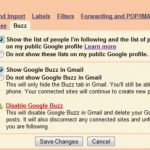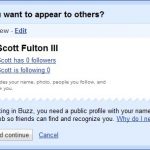Microsoft to begin deploying final EU browser ballot March 1

In an early morning blog post Friday, Microsoft Deputy General Counsel Dave Heiner announced that final field testing of the company's Web browser ballot screen for European Windows customers (XP, Vista, and Windows 7) is under way now. The goal is to have a fully operational ballot screen by March 1 -- a week from Monday.
"External testing of the choice screen will begin next week in three countries: the United Kingdom, Belgium and France," Heiner reported. "Anyone in those countries who wishes to test it can download the browser choice screen software update from Windows Update. We plan to begin a phased roll-out of the update across Europe the week of March 1."
Exclusive: Google's latest Buzz privacy changes enable possible new exploit

Today, Google Gmail customers are seeing a promised round of software changes whose purpose is to make Google Buzz users more aware of their privacy options, and to give them a more obvious way to back out of Buzz. These changes come a mere nine days after the social networking product's rollout as an element of Gmail, although some have already claimed personal damage, and have already begun legal action.
Before we went to that extreme, Betanews tested the Buzz changes on accounts where Buzz was already set up. There we noticed the promised Buzz tab has been added to Gmail settings, where as we expected, the user is given the option to withdraw the lists of other Buzz users she's following from her public Google profile. This is effectively a copy of the option from Buzz setup that Google only made prominent after its first round of changes at this time last week.
Microsoft's Social Connector adds a bonus upgrade for Outlook 2007

Download Outlook Social Connector 32-bit Beta for Outlook 2007 for Windows from Fileforum now.
It's no surprise that Microsoft has begun distribution of the first beta of Outlook Social Connector, the Office plug-in that adds a list of each contact's social network activity to Outlook. It's also no surprise that business contacts network LinkedIn is Microsoft's first partner -- that fact has been known for some time. What is interesting is that today's beta release also contains a version that supports Outlook 2007, adding to it one key feature that could very well have been a reason to upgrade to Outlook 2010: the People Pane.
Canada curious about Google Buzz, EPIC accuses Google of deception

The office of Canada's Privacy Commissioner, Jennifer Stoddart, confirmed to Betanews this afternoon that she has contacted Google officials by telephone, in an informal inquiry regarding its Google Buzz social networking service. Although Comm. Stoddart's office acknowledges the changes the company has already made, and is continuing to make, since Buzz's rollout last February 9, she says she asked a conference of Google officials why they released Buzz service to Canada without any advance notification to government regulators there.
Stoddart's office has not reported the nature of Google officials' response, or whether they responded at all. The phone call does not appear to be, at least at this point, the full-scale investigation implied by a CBC News report yesterday. But a statement issued by Stoddart's office in response to Betanews' inquiry this morning indicates that she may have told Google that, had they consulted with her first, she might have noticed the potential for privacy issues, enabling them to make changes prior to launch.
Internet Explorer 9 demos set for March MIX conference

It could possibly be at least as significant a technology upgrade as Windows 7 itself: the replacement of Microsoft's current Web browser -- and with it, its rendering engine for dynamic text -- with entirely new code for Internet Explorer 9. With both Microsoft's forthcoming Office Web Apps and now its Windows Phone 7 Series dependent on dynamic rendering (as ascertained from demos at MWC last Tuesday), as well as JavaScript performance, the judgment of the company's mobile applications performance could depend entirely on the capability of its new Web browser.
After Microsoft's latest refresh of its conference schedule for MIX 10 in Las Vegas in four weeks, a non-committal statement on its conference blog, under the heading, "Internet Explorer 9 at Mix 10" reads, "After all, what would our premier web conference be without a browser update!?" Although the time and date for this "update" have yet to be set, the notice appears beside a picture of Dean Hachamovitch, Microsoft's IE General Manager and one of MIX' most popular speakers each year.
First signs of Broadband Plan scale-back include subtle dig at FCC predecessor

The need for an American national broadband deployment plan, focused at the time on extending broadband access to rural areas, was not initiated by current Federal Communications Commission Commissioner Julius Genachowski. It was proposed last May by his immediate predecessor, then-Acting Chariman Michael Copps, who remains a commissioner today. Copps' proposition likened the deployment of a national broadband strategy to the historically successful construction of the interstate highway system -- Pres. Dwight D. Eisenhower's crowning achievement after D-Day (PDF available here).
Comm. Copps invoked that analogy in order to emphasize not only the tremendous public works effort that would be required, in his view, to deploy truly fast broadband Internet service cross-country, but also a massive public/private partnership that relied on corporate investment, and faith in an eventual supreme payoff for all of American industry.
A BlackBerry browser with a 100% Acid3 score: RIM finally picks up the Torch

It turns out Microsoft isn't the only mobile platform producer resetting its ecosystem this week. In a lower-key move that could actually affect millions more customers than Microsoft's reboot of Windows Phones yesterday, Research In Motion today took over control of Mobile World Congress' side-show, called "App Planet," with a series of developer-focused seminars whose intention appears to be resituating developers on the new purpose of the BlackBerry platform.
While BlackBerry has never been much for eye-candy, what passes for such took center stage during a demo by CEO Mike Lazaridis this morning. Making good on the promises inherent in RIM's acquisition of browser maker Torch Mobile last August (taking it out of the Windows Mobile picture for good), the company presented the first public demonstration of a real Web browser for BlackBerry. Perhaps the last mobile platform to have a built-in browser built for standards higher than 1997, the new BlackBerry browser produced accurate Web pages, zoomed into and out of pages with reasonable speed (not exactly an iPhone-like rush, but not thumb-twiddling either), and scored a 100% on the Web Standards Project's Acid3 test.
Tight window for developers of Windows Phone 7 Series before Q3

Microsoft CEO Steve Ballmer closed this morning's preview of Windows Phone 7 Series at Mobile World Congress in Barcelona by saying he wanted to diffuse some of the buzz that would inevitably be generated. This after the company intimated to reporters during last January's CES that Windows Mobile 7 would be introduced this week, then later urging them to issue a correction on the name.
But he left developers in a bit of a quandary, many of whom are now thinking, what do we do now? The Windows Mobile 6 and 6.5 SDKs are still being actively distributed, even though WP7S will run applications through an entirely different model. In the end, the new system may end up being more about the Xbox, Bing, Zune, and Office brands than even Windows, which is represented now almost in name only. Windows Phone 7 Series is not, as Chief Software Architect Ray Ozzie once suggested, Windows on a different scale.
Linux shakeout merges Maemo with Moblin, while Symbian^3 awaits its future

Before today, if you had asked, which mobile phone company is the one that intends to split itself into two pieces, you might have gotten the answer: Motorola. Today, Nokia is the company taking two directions, both of which are a little startling, and both of which appear uncertain.
First, it's made a decision to merge its open source mobile Linux project, maemo, into Intel's Moblin project, with the result being MeeGo -- a product that, at least at first glance, bears more resemblance to parent Intel than parent Nokia. Second, Symbian proponents are still awaiting word about a future Nokia phone, the N87, believed to be the launch pad for the now-fully-open-source Symbian^3 operating system. But they're waiting in the backseat, it would appear, as Windows Phone 7 Series and MeeGo get the lion's share of attention, on this first day of Mobile World Congress in Barcelona.
Google's next attempt at a more secure Buzz may take a few more days

A Google spokesperson confirmed to Betanews this afternoon that a second round of privacy changes, the nature of which was revealed last Saturday evening, is still being developed, and may yet go live "in the next couple of days."
Among those changes will be a more obvious way to turn Buzz off (no pun intended), a feature that remained obscure after the service's first round of privacy changes last Thursday. At that time, Google chose to un-hide an option that new customers may easily have ignored: to not only build a list of followers from existing Gmail contacts, but to publicize that list on the Buzz user's public profile. Depending on what other Google services the customer may have been using, that profile could possibly have been visible to anyone, including non-Buzz users.
Google Buzz and Outlook 2010 Social Connector: Competitors or partners?
![A snippet from the activities list that appears beside a contact or a contact's e-mail message, in Outlook 2010 with Social Connector attached. [Courtesy Microsoft]](https://betanews.com/wp-content/uploads/media/45/4525-150x150.jpg)
Since the launch of Google Buzz last Tuesday, we've been hearing more analyses from professionals and bloggers warning of a possible showdown of sorts between Google and Microsoft in the social space. Buzz is Google's social connection with its Gmail; but Microsoft already announced last year its own social connection with its mail platform: the forthcoming Social Connector plug-in for Outlook 2010, due for release with the rest of Microsoft Office 2010 this June. The latest release candidate for Office 2010 was distributed to private testers earlier this month.
Social Connector promises to transform Outlook 2010 into a live network teeming with contacts who share not just e-mail, but chats and texts through Windows Live and documents through SharePoint. Messages received from a "live" contact will be adorned with that person's availability, location, and a record of recent activities. Though LinkedIn has already signed on as Microsoft's first third-party partner, connectivity with Facebook -- probably distributed by Facebook, not Microsoft -- appears likely. So much of the same kind of functionality folks are seeing with Buzz, will likely appear in Outlook as well, although slanted more toward professional tasks rather than personal friends and acquaintances.
Will the ribbon work in Mac? Design clues from the Office 2011 screenshot
![Microsoft's screenshot of an early build of Office 2011 for Mac, now featuring the ribbon. [Courtesy Microsoft.]](https://betanews.com/wp-content/uploads/media/45/4522-150x150.jpg)
Microsoft was under no obligation to build a ribbon component, similar to the one premiered in Office for Windows, for the Mac. That's especially true given the fact that the menu bar is such a prominent element of the Mac user experience. Ever since System 7, the menu bar -- which remains fixed to the top of the screen -- indicates which application is active. In Windows, applications have their own menu bars, if they have them at all; and starting with Office 2007, the ribbon replaced the menu bar.
In Windows, the replacement of the menu bar for Office apps was one of its design goals: a way to reduce screen clutter and minimize the steps or clicks required for a user to find a function. At least that's how Microsoft presented the original idea back at PDC in September 2005. In MacOS, you can't replace the menu bar, so a ribbon would have to find some way of complementing it, sharing the workload with it, in a way that makes sense to the user.
Google adjusts Buzz setup for privacy, makes 'public' choice more obvious

Already sensing that too many potential users were attributing the "evil" moniker to Google (in the absence of actual evil in the world), the company yesterday made adjustments to its Google Buzz sign-up procedure. In Betanews tests, we found Google's altered dialog box is much more descriptive about the repercussions of setting up a public profile. It uncovers a critical choice about what you share with others publicly, that had been buried beneath an Edit link, by copying it up front where everyone can see it.
The danger involved with a new user setting up Buzz without being mindful of its default consequences, is that her public profile can be automatically filled with the names and profile links of Gmail contacts she communicates with most. Betanews tests this morning indicate that changes Google has made to Buzz setup appear to reduce that danger somewhat:
Opera 10.5 leaps to beta, holds on to unexpected performance lead

Download Opera 10.5 Beta 1 for Windows from Fileforum now.
Just yesterday, we saw yet another daily build of what Opera Software was calling its "pre-alpha" of the Opera 10.5 Web browser, a product that the company certainly wanted folks to test, even though they were warned it wasn't even ready for daily use. With various software publishers' development schedules being organized so differently from one another, it's difficult enough distinguishing "previews" from "alpha previews" from "preview alphas" -- just yesterday, for example, Mozilla finalized a public "developer preview" of Firefox 3.7 Alpha 1, closing off its "Alpha 1 preview" track before starting, on the same day, its "Alpha 2 preview" track.
Does Google Buzz offer better privacy than Facebook?

With Google already the center of controversy worldwide over how it uses the information it gleans from its search users, red flags were almost certain to be sent up over Google Buzz, announced Tuesday. It's the company's new social platform for sharing bits of Twitter-like communication, and it's built rather cleverly on its existing Gmail platform.
The red flags concern how Google leverages Gmail to create a pre-established social network for Buzz users. Unlike a fresh, new social network that asks incoming users to build their lists of followers from scratch, Buzz starts out by collecting a list of folks who appear to be doing the most communicating with the incoming user via Gmail.
BetaNews, your source for breaking tech news, reviews, and in-depth reporting since 1998.
© 1998-2025 BetaNews, Inc. All Rights Reserved. About Us - Privacy Policy - Cookie Policy - Sitemap.
